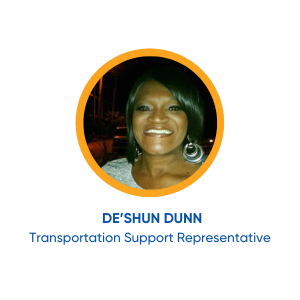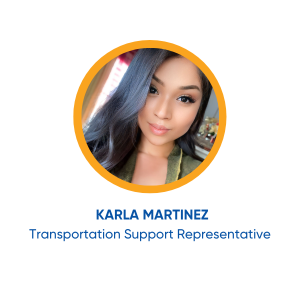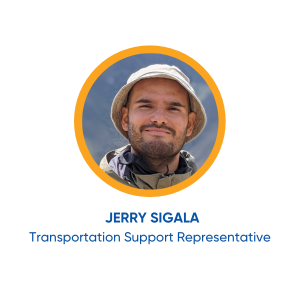On the Go’s client-centered program is founded on the principle of putting our riders at the center of everything we do. This means our riders experience a dependable, personal approach every time they call On the Go. Riders are greeted by a friendly, compassionate, real person on the other end of the line. Many of our riders are older adults and people with disabilities, to whom having a live agent to talk to and assist with their transportation needs makes the difference between making an appointment on time or canceling it.
The ability to attend a doctor’s appointment, have groceries for the week, or visit with family can be determined by something as simple as having easily accessible, reliable transportation. The no-show rate of On the Go’s riders is an industry-low of 3%, compared to the national average of 15%-18% for rideshare platform users.
The program’s success is largely due to the empathic approach of On the Go’s Transportation Support Representatives (TSRs). Before picking up the phone, all TSRs complete a required emotional intelligence training that equips them with the skills to effectively communicate with riders. They create personal connections with the riders, pay special attention to details, and work together as a unified team. Read on to learn how TSRs like De’Shun Dunn, Karla Martinez, and Jerry Sigala ensure accessible and compassionate transportation for those who need it most.
Personal Connections with Riders
TSRs establish rapport with riders in several ways, ensuring they feel valued and understood. Many riders call in regularly to schedule rides, so in addition to learning their names, the TSRs learn their transportation preferences and different styles of communication.

“All our riders have different personalities – and that’s what I love. Some are a little feisty, others are gentler and sweeter. But I love them all,” said TSR De’Shun Dunn, who went on to say that she often thinks of the riders as her own grandparents on the other end of the phone.

“I feel the same way!” chimed in Karla Martinez. “I recently had a grandmother pass away, and I only have one grandfather left. Sometimes, when I’m talking to riders, I feel like I’m talking to my grandparents again. It makes me appreciate them so much.”
Martinez continued, “Some of our riders don’t have family members they can talk to, so when we remember who they are, they say it makes them feel special.”

Another member of the TSR team, Jerry Sigala, reflected on a connection with a rider:
“One rider in particular made me realize what we do is important. Before using On the Go, he would struggle to get rides. He said, ‘I’m tired of needing to ask my neighbor for rides. I want to be able to do my own thing. I know I probably don’t have a lot of time left. I just want to enjoy the small things, like going to the library and talking to the clerks at the store.’ In that moment, I realized it’s not just about scheduling rides to Walmart or the doctor’s – it’s giving people a chance to spend time in their community and enjoy the time they have left.”
Special Attention to Details
Paying close attention to riders’ needs while coordinating with drivers helps TSRs successfully facilitate safe transportation.
De’Shun Dunn reflected on how paying attention to the weather where a rider lives can be important – and no small feat while coordinating rides across the country. “If I know the weather is really hot or cold, I make sure the rider knows exactly when their vehicle will be arriving, so they’re not sitting outside in the heat or the snow while they’re waiting,” she said.
Sigala, bilingual in Spanish and English, stressed the significance of building trust with clients from diverse backgrounds: "Spanish is my first language, so when I get to schedule rides for Spanish speakers, it feels familiar.” This cultural competence ensures effective communication and fosters an environment of trust, which is crucial in the field of transportation for seniors and people with disabilities.
Coordinating wheelchair transportation is another specialty of Sigala’s. “Special considerations need to be made when I schedule rides for wheelchair users. How big is the chair? Does it fold up?” Sigala continued, “I have a rider who requires a specific type of vehicle to fit her wheelchair. When she first started with On the Go, she told me she hadn’t been to the doctor in months despite needing treatment for her cancer. In instances like this, access to transportation can be lifesaving.”
Working Together as a Unified Team
The most frequently expressed sentiment among On the Go’s TSRs: “I love what I do.”
“You know you love your job when a shift goes by really fast,” said Martinez. “We have a strong team here, and we have fun!”
This camaraderie likely contributes to an impressive statistic: On the Go has a 100% retention rate of TSRs since its beginning, an unheard-of achievement in an industry where the average turnover rate in a call center is 30-45% annually.
“I’m so glad I became a TSR and joined this team,” reflected Dunn. “Regardless of where we’re working, all of us have access to a general chat, and we can see when each ride is scheduled or taking place. If any of us need help with something, the team is there for support.”
Conclusion
Transportation Support Representatives like De’Shun Dunn, Karla Martinez, and Jerry Sigala personify On the Go’s dedication to its riders. Their stories weave a narrative of genuine connections, treating each scheduled ride as a lifeline to essential services.
The experiences of On the Go's TSRs embody a mission to make a lasting impact on the lives of those they serve, ensuring every scheduled ride is a pathway to empowerment, connection, and an improved quality of life for seniors and individuals with disabilities.
